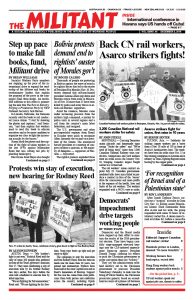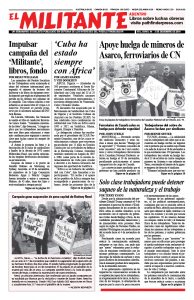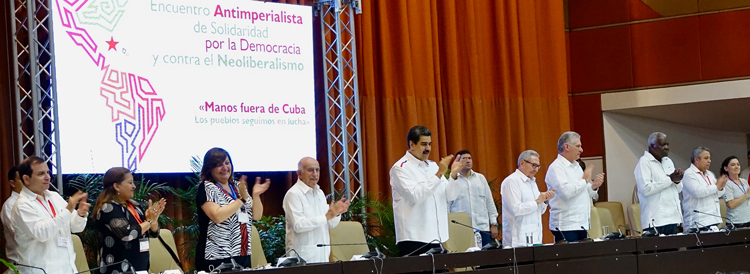HAVANA — “For showing solidarity, and being consistent with our history of struggle and sacrifice, for being a sister and companion of peoples who resist, Cuba is condemned and sanctioned beyond limit,” said Cuban President Miguel Díaz-Canel Bermúdez. He was speaking here at the closing session of an international “Hands off Cuba” conference held Nov. 1-3.
“Our country today suffers a criminal tightening of the blockade,” Díaz-Canel said. Washington is expanding use of the Helms-Burton Act, “which persecutes and sanctions third countries” that trade and have banking ties with Cuba. He called attention “to harassment, persecution and sanctions on countries, companies and ships that participate in transporting fuel.”
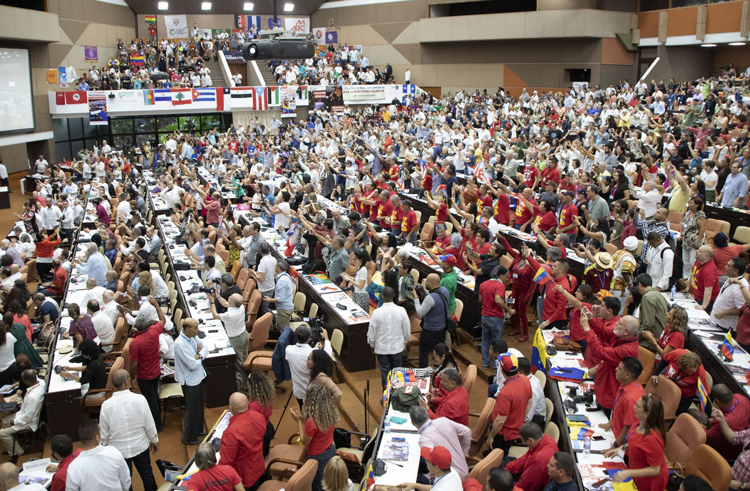
But the Cuban people and government “will never yield” to pressure by the U.S. government, nor give up their internationalist assistance to Venezuela and other countries around the world, the Cuban president said.
The event, organized in response to Washington’s stepped-up economic sanctions and threats against the Cuban Revolution, drew more than 1,300 delegates from 86 countries across the Americas, Africa, Europe and Asia. It was called by the Cuban Institute for Friendship with the Peoples (ICAP) and the Central Organization of Cuban Workers (CTC).
The conference brought together an array of participants. These included trade union delegations from Trinidad, Panama, Brazil, France and other countries, as well as workers and students involved in the current social explosions in Chile, Ecuador and Haiti. Also participating were members of solidarity groups from the U.S. and Canada; activists in the fight to legalize a woman’s right to choose abortion in Argentina; and present and former government ministers from countries in Africa, Latin America and the Caribbean.
Joining Díaz-Canel on the platform at the closing session were Raúl Castro, first secretary of the Communist Party of Cuba, and other high-ranking Cuban leaders, as well as Venezuelan President Nicolás Maduro. Maduro’s presence was an affirmation of the Cuban leadership’s refusal to break its ties of solidarity in face of the U.S.-led assaults on Venezuelan sovereignty.
Stepped-up U.S. attacks
The U.S. government and its allies are waging a propaganda war, Díaz-Canel said, to try to rationalize Washington’s attacks. Capitalist spokespeople falsely blame the Cuban and Venezuelan governments for mass protests in Chile and Ecuador. But it’s the capitalist system and the U.S. and other imperialist rulers that cause the economic and social disaster generating these upheavals.
Replying to Washington’s “crude lies,” Cuban Foreign Minister Bruno Rodríguez told the opening session that what the U.S. rulers and their capitalist allies in the region are really concerned about is “the example of the Cuban Revolution.”
Also addressing the opening plenary was ICAP President Fernando González. González was one of five Cuban revolutionaries, “the Cuban Five,” imprisoned in the U.S. for up to 16 years for their work to defend Cuba from U.S.-backed terror attacks.
Both he and Rodríguez described the escalation of the U.S. economic war against the Cuban Revolution, including full implementation of the Helms-Burton Act for the first time since it was signed into law in 1996 by President William Clinton. Washington is now applying the law’s Title III, which allows U.S. citizens to sue third-country as well as Cuban individuals and companies who they allege have connections to property nationalized for the benefit of the Cuban people. The aim is to stop businesses in Canada, Europe and elsewhere from maintaining trade, transportation and financial ties with Cuba.

Rodríguez denounced expanded U.S. restrictions on trade with Cuba, including on ships visiting the island, which is cutting income from tourism and slowing oil imports. In recent months Cuba has faced severe difficulties in acquiring fuel, which affects industrial and domestic power supplies, he said. Lines of cars and trucks outside gas stations confirm the impact.
González responded to Washington’s campaign of smears against Cuba’s medical assistance to countries around the world. Today some 29,000 Cuban doctors, nurses and other medical volunteers work in 65 countries.
During the opening plenary discussion, Cuban delegate Enrique Ubieta noted such international solidarity is the product of the transformation of millions of Cubans brought about by a deep-going socialist revolution. Ubieta is the author of Red Zone, a book about the more than 250 Cuban volunteer doctors, nurses and other health workers who successfully led the 2014-15 fight to end the Ebola epidemic in West Africa.
Delegates hosted in Barbosa
Ubieta’s point about the character of the Cuban Revolution was brought home at a social event and concert for conference participants hosted by the Committees for the Defense of the Revolution in Havana’s working-class housing complex of Barbosa. The CDRs are neighborhood organizations that involve millions of working people in Cuba. CDR members prepared food and drinks for the delegates, inviting us into their homes and engaging in street corner discussions.
Roberto Guerra told us the 54-building Barbosa complex was constructed by volunteer work brigades in the 1980s and that he was one of the brigadistas.
Solidarity with Cuban Revolution
On the second day of the conference, delegates broke down into six commissions. One of the largest, attended by some 350 delegates, was on “Solidarity with Cuba and other just causes.” It was held at the Latin American School of Medicine (ELAM). In the 20 years since its founding, the school has graduated nearly 30,000 doctors from 105 countries. Today 1,200 foreign students from 80 countries are receiving free, quality medical training there.
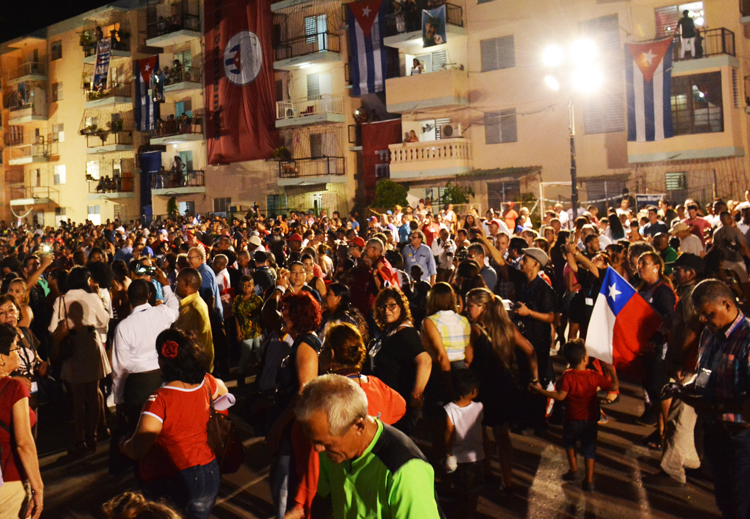
The international delegates were welcomed by hundreds of ELAM students who lined the sidewalk. Students organized an evening musical show and took part in the opening and closing sessions.
Cuban Health Minister José Ángel Portal spoke of Cuba’s medical collaboration around the world, including in the fight against Ebola; Cuba’s medical aid to countries devastated by natural disasters from Pakistan to Haiti; and the medical care given to 25,000 children affected by radiation in the Chernobyl nuclear explosion in Ukraine.
Delegates then took part in regional workshops. The North America meeting was chaired by ICAP’s Yamil Martínez. Participants discussed plans for activities that include ongoing monthly solidarity actions in Canada and Quebec; celebrations in early December to mark the fifth anniversary of the freeing of the last of the Cuban Five; and a March 2020 North American conference in New York City against the embargo. In his opening remarks, Martínez also called attention to solidarity brigades to Cuba planned this coming spring and summer. Other workshops discussed coordinated plans for their regions.
At the North America meeting, Estela Vazquez, a vice president of Local 1199 of the health workers union and member of New York’s Cuba Sí Coalition, pointed to the current uptick in workers’ struggles in the U.S. They present an opening to reach more people with the truth about the Cuban Revolution, she said.
“Solidarity is not charity,” Vazquez said, citing African freedom fighter Amilcar Cabral. “It starts from common interests.”
Steve Clark, also a member of the Cuba Sí Coalition and a leader of the Socialist Workers Party, added that to reach working people, supporters of the Cuban Revolution need to go to workers’ picket lines, organizations and neighborhoods with books, newspapers and other material that explain why working people have a stake in defending the revolution.
In response to proposals by some at the workshop to focus on appeals to Democratic Party members of Congress and candidates during the 2020 U.S. election campaign, Clark pointed out that Washington’s 60-year-long attacks on the Cuban Revolution have broad bipartisan support. Many, from the U.S.-organized invasion at the Bay of Pigs to the Helms-Burton law, were carried out by Democratic Party administrations.
This issue was also addressed in the final conference plenary. After a draft Action Plan had been read, a delegate from Puerto Rico proposed dropping a sentence calling for “No more Trump.” The brutalities of U.S. colonial rule in Puerto Rico have been carried out equally under Democratic and Republican administrations, said Aleida Centeno of the Nationalist Party. It was President Barack Obama who imposed the belt-tightening “fiscal control” board on Puerto Rico, for example, she said. The declaration should say, “No more U.S. imperialism!”
Social and political crisis
“I feel it’s my duty to state that difficult times lie ahead,” Cuban Foreign Minister Bruno Rodríguez said at the opening plenary. Discussion of the social and political crisis wracking Latin America ran throughout the conference.
Conference participants unanimously condemned hostile intervention and measures by Washington against sovereign governments in Venezuela, Bolivia and elsewhere.
In assessing prospects to advance the goals of the conference, some delegates argued that the key today is better use of “social media.” Speaking at a commission on “Decolonization and Cultural War,” panelist Amauri Chamorro raised a note of caution.
“We can’t substitute for the need to go door to door, to engage in one-on-one dialog with people.” Chamorro, a former chief of communications for past Ecuadoran President Rafael Correa, said. “We can’t fool ourselves into thinking that elections were won or lost because of good or bad ‘communication’ on our part.” What’s needed is “good politics,” he said.
Puerto Rico anti-colonial fight
The fight for Puerto Rico’s independence from U.S. colonial rule was another conference theme. Cándida Valderrama, a member of the 50-strong delegation from Puerto Rico, told the gathering that Washington “controls all the most important spheres of the island — customs, immigration, education, banking, labor policy, telecommunications, environmental regulations and foreign trade.”
A U.S. government-appointed fiscal control board has enforced cuts in public employee jobs and pensions, the closure of hundreds of schools and other attacks on the living standards of working people, she said.
At the closing plenary session, María de Lourdes Santiago, vice president of the Puerto Rican Independence Party, read the Final Declaration of the conference. Delegates enthusiastically applauded its call for support to the struggle for Puerto Rico’s independence.
Other points in the declaration included saluting Cuba’s long record of support to liberation struggles around the world, including in Angola, Namibia and South Africa. It opposed environmental destruction wrought by the imperialist system, and called for support for the struggle for a Palestinian state, independence for the people of Western Sahara from Moroccan rule and ongoing talks by the governments of North and South Korea.
The conference also adopted a Solidarity Statement, read out by U.S. delegate Gail Walker, executive director of IFCO/Pastors for Peace. The statement underscored Washington’s failure in its more than 60-year-long goal — “to destroy the Cuban Revolution.”
The Final Declaration called for broadening opposition to the U.S. economic war against Cuba and for return to Cuba of the territory of Guantánamo occupied by the U.S. naval base for nearly 125 years in violation of Cuba’s sovereignty.
The conference Action Plan encouraged participants to organize activities to tell the truth about the U.S. attacks on Cuba and about the example of Cuba’s socialist revolution.
